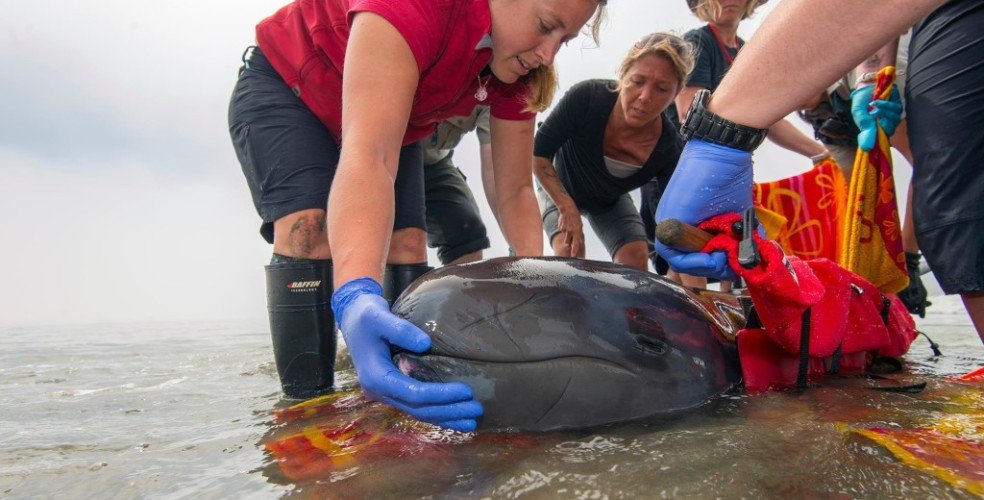Vancouver Aquarium cetacean ban could mean euthanizing whales and dolphins

A ban of cetaceans at the Vancouver Aquarium could lead to whales and dolphins being euthanized instead of rehabilitated, according to Fisheries and Oceans Canada (DFO).
The DFO collaborates with the Aquarium to deal with stranded, wounded, injured marine mammals through the Aquarium’s Marine Mammal Rescue Centre.
But earlier in March, the Vancouver Park Board decided to end the display of cetaceans at the aquarium. The draft bylaw amendment will be put to the vote on May 15.
See also
- No more cetaceans in captivity at Vancouver Aquarium after Park Board vote
- Cetacean ban will 'devastate' our rescue centre, says Vancouver Aquarium
Research scientist John Ford, at the DFO’s Pacific Biological Station in Nanaimo, said if the amendment is passed it could leave injured whales and dolphins with nowhere to go.
“If cetaceans were brought in and judged to be unreleasable, it’s not clear what the fate of that animal would be,” Ford told Daily Hive in a phone call.
Ford says it might be possible to take the sick cetacean to another facility, but this would be very unlikely.
“The Vancouver Aquarium Marine Mammal Rescue Centre is the only facility in this part of the world that is capable of taking in and rehabilitating or treating injured or sick small cetaceans,” said Ford.
Even if it were possible to find another aquarium to care for the cetacean, such as SeaWorld in San Diego, suggests Ford, that still isn’t a practical option.
“In any event, typically with small cetaceans that end up on the beach, they’re gravely ill or injured,” said Ford. “It’s very unlikely they would survive transportation from the beach to another facility that might be thousands of kilometres away.”
Chester’s fate could have been different
With nowhere to take the distressed whale or dolphin to get treatment, euthanasia is then a consideration, says Ford.
“DFO has a protocol for euthanasia in these kinds of situations where the decision has been made it’s the most humane option.”
Ford said a cetacean is only euthanized “if it’s clear it can’t go back offshore or back to its group immediately in the vicinity.”
While harbour seal pups – not cetaceans – are by far the most common mammal found on our beaches in need of rescue and rehabilitation, cetaceans do sometimes need help.
The Aquarium currently has three cetaceans in captivity, Helen, a Pacific white sided dolphin, Daisy, a harbour porpoise, and Chester, a false killer whale (a type of dolphin).
All three animals were rescued. Meanwhile, the Aquarium has no whales in captivity, since the death of its two belugas, Aurora and Qila in November last year.

Chester the false killer whale being rescued in 2014 (Vancouver Aquarium)
Ford cites Chester, the false killer whale, as an example of the DFO’s work with the Vancouver Aquarium in caring for animals who can’t go back into the wild.
“The false killer whale was authorized by the DFO to be taken to the Aquarium because it was clear it wouldn’t survive if simply pushed back out the sea,” said Ford.
When Chester was found on a Tofino beach in July 2014, he was just four to six weeks old and in severe distress with a number of lacerations and wounds along his body.
“They were able to bring it back to health, but the animal was judged by the DFO… that it could not be released back to the wild. It would very likely not survive,” said Ford.
The Park Board has said it is looking into allowing Chester, Helen and Daisy to stay at the Aquarium after the ban is imposed, either until they are moved or they pass away naturally.
Ultimately, Ford says, the DFO wants to raise awareness of the impact the proposed ban could have on the work they do to rescue whales and dolphins, like Chester.
“Treatment of sick and injured cetaceans requires high specialized, experience and skill from husbandry staff, and veterinarians,” said Ford.
“Those kinds of very experienced people are not very common in North America. We’re fortunate that the Aquarium has these people on staff at their rescue centre.”

